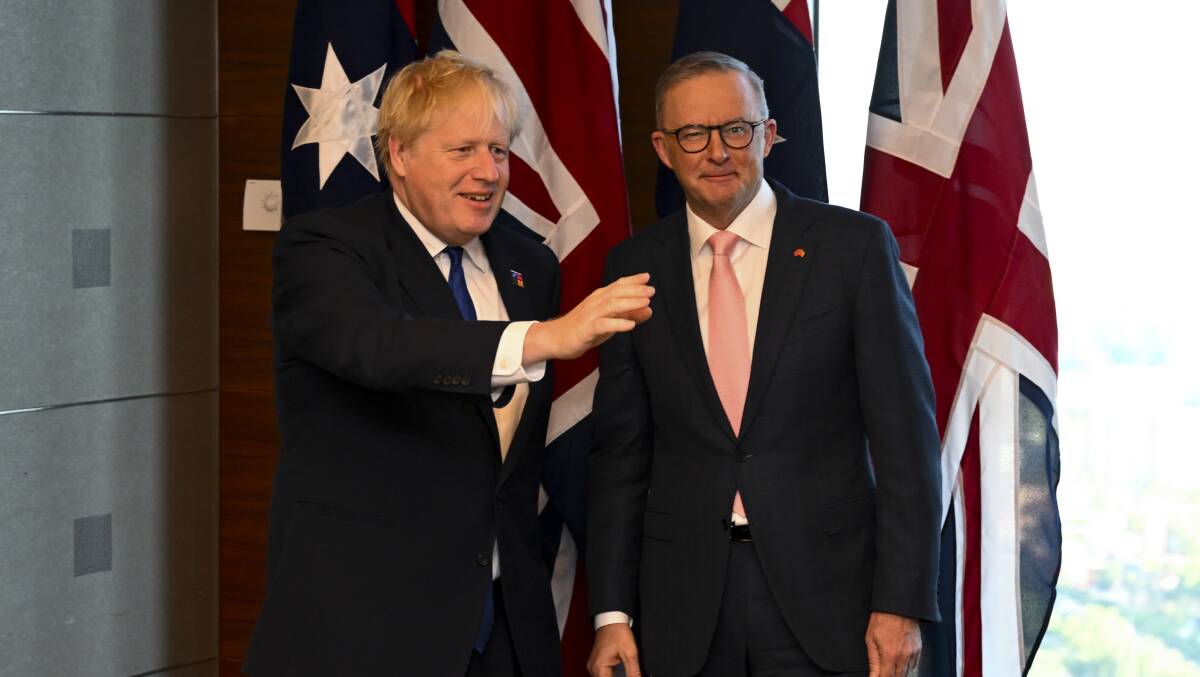
There was a lot of bad news from Europe for China this week - and very good news for Australia.
European countries are waking up. The world's rich democracies have taken steps towards uniting in resisting China, by far the greatest threat to this country's security.
These are still early days, but the long-term chances of preventing Beijing from dominating this side of the world have improved.
The two events in Europe that must have had steam coming out of nostrils in Beijing were meetings of the Group of Seven major industrial countries and NATO, the security alliance set up 73 years ago to prevent Soviet expansion. In an unprecedented move, NATO invited Australia, Japan, New Zealand and South Korea to attend.
Both meetings produced anti-China statements, though no one officially described them that way. More important than the statements themselves is the new mindset that they revealed: countries that formerly smiled at Beijing, regardless of its behaviour, have had a gutful of authoritarian aggression.
Take the G7 first. Two of its members have been fully alive to the security and economic threat from China for years - the US and Japan. But the other five - Britain, Canada, France, Germany and Italy - have preferred to focus on the immediate Chinese market for their exports.
The G7 is a heavyweight economic grouping. That's important, because big economies can deny big trading opportunities and they can also pay for a lot of military power.
The statement that followed the G7 meeting last year mentioned China four times. This year the Middle Kingdom got 14 mentions, generally disagreeable to it.
Sometimes using indirect language, the G7 had a go at China about its attempt to seize the South China Sea, standing threat to attack Taiwan, oppression in its western province Xinjiang, breach of its agreement with Britain to respect Hong Kong's freedoms, and abuses in trade.
The G7 also, indirectly, told China to cool it in the East China Sea, where it and Japan have competing territorial claims.
While the G7 is about economics, NATO is about defence. And it didn't invite the four Asia-Pacific countries to its meeting because it wanted to hear their views on Russia.
Instead, the reason is again that the non-US members of the great alliance have begun to understand that China is a big long-term problem.
NATO as a group has a good excuse for ignoring China. The alliance's business is preventing Russian expansion, not attending to the Asia-Pacific, and it has quite enough to worry about in its own backyard right now.
But it didn't use that excuse.
China presents "systemic challenges", NATO members said in a policy document called its strategic concept.
"In this year's strategic concept, allies have stated that the People's Republic of China's ambitions and coercive policies challenge our interests, security and values," said NATO Secretary-General Jens Stoltenberg.
There is an overlap between the two meetings. All the G7's members except Japan are in NATO.
But notice that NATO altogether has 30 members and will soon grow to 32. Add the four Asia-Pacific invitees and you have almost all the world's democratic developed countries.
It's hard to overstate how important this growing unity is for Australia.
If the US is supposed to carry almost all the load of resisting China's attempts to dominate this region, we face a terrible risk that one day Washington will shrug and give up. If it is strongly supported from Europe, its load will be less and its determination stronger.
A lot of what's happening is basically what this column discussed a week after Russia invaded Ukraine: Vladimir Putin has made the world tougher for China, because other countries are no longer in any mood to put up with authoritarian aggression.
China's habitual hostility and wrongdoing would have got the Europeans there eventually, but Putin has hurried them up.
MORE AGE OF THE DRAGON:
You'd expect Europe's awakening to alarm officials in Beijing, and we know that it has. We heard plenty of table-thumping about the G7 and NATO meetings before they were held.
President Xi Jinping last week criticised "expanding military alliances". That's because China is always dead set against other countries acting in unison. It likes to overpower them individually.
The most fascinating reaction came from China's ambassador to the UN, Zhang Jun.
"We firmly oppose certain elements clamouring for NATO's involvement in the Asia-Pacific, or an Asia-Pacific version of NATO on the back of military alliances," said Zhang.
How curious. For the moment, there is hardly anything that NATO will or even can do to reinforce security on our side of the world. Why does Zhang bother to talk about such a thing?
Well, China has an excellent habit of long-term thinking. It can see the trend in Western policy in relation to aggressive authoritarian states, and it can see that all its relationships with democracies are rapidly worsening.
So Beijing must be wondering what the Europeans will be willing to sign up to if and when the Ukrainian war cripples the military power of their neighbouring threat, Russia.
The last thing China wants is for all the developed democracies to begin assembling their firepower in the Western Pacific to resist its expansion - and presenting it with a risk of war with all of them.
We must not get ahead of ourselves. There will surely be some backsliding as some European countries worry again about exports.
Even if there were none, the European militaries would not be coming to the Asia-Pacific in strength anytime soon.
But that may be the way things are heading.
- Bradley Perrett was based in Beijing as a journalist from 2004 to 2020.


